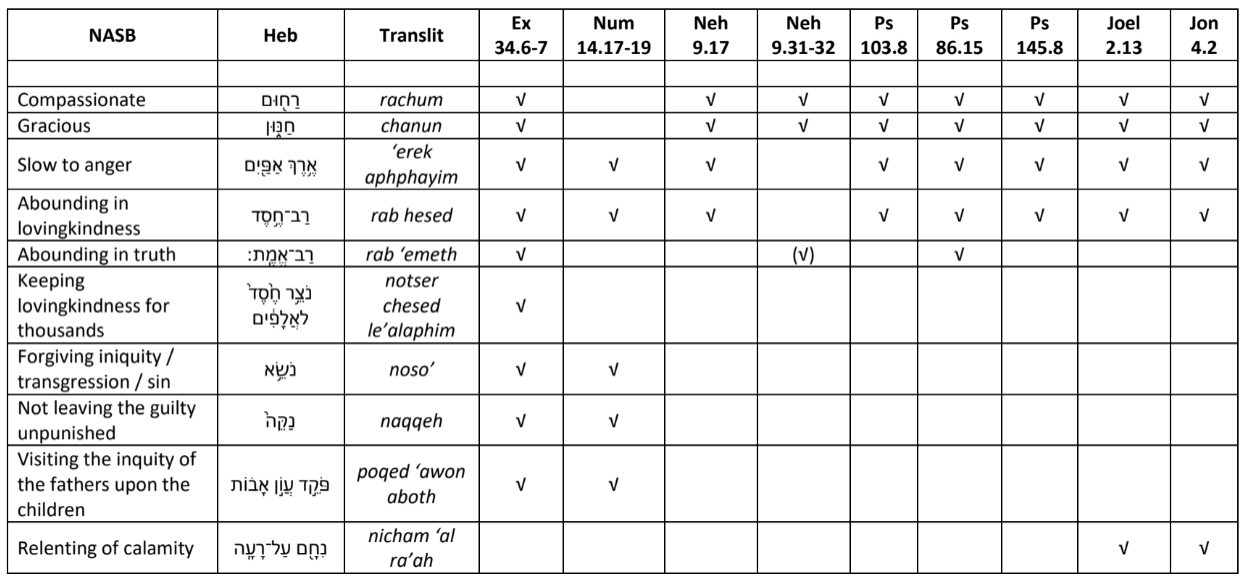When You’re Tempted to Hate People, Part 3: Compassion
Image

Read the series.
In his primary description of himself, God includes a list of related attributes (Ex 34.6-7):
- Compassionate
- Gracious
- Slow to anger
- Abounding in lovingkindness
- Abounding in truth
- Keeping lovingkindness for thousands
- Forgiving iniquity, transgression, and sin
- Not leaving the guilty unpunished
- Visiting the iniquity of fathers upon children
And in the parallel prophetic passages,
- Relenting of calamity
For easy comparison, I’ve posted a chart of the parallel passages.

There’s a lot here that calls for investigation, rumination, and careful analysis. God describes himself in ways that emphasize tenderness without the weakness of permissiveness. We’ll take a few posts to cover this list, occasionally combining similar terms for efficiency and clarity.
We begin, as God does, with compassion.
The Hebrew word is closely related to the word for “womb”; it speaks of the intense feeling we get in our midsection when we’re deeply affected emotionally. We speak informally of being “punched in the gut” or “kicked in the stomach” when we received intensely emotional news.
Interestingly, the Gospels speak of Jesus as often feeling this way, of being “moved with compassion.”
- When he saw the people “as sheep having no shepherd” (Mt 9.36; Mk 6.34)
- When he saw a large crowd near the Sea of Galilee—whom he was about to feed miraculously (Mt 14.14; Mk 8.2)
- Similarly just before he later fed the 4000 (Mt 15.32)
- When he healed Bartimaeus and the other blind man just outside Jericho (Mt 20.34)
- When he saw the widow of Nain in her son’s funeral procession (Lk 7.13)
Paul, recognizing this characteristic of his Lord, speaks of longing for the Philippians “in the bowels of Jesus Christ” (Php 1.8 KJV).
God, knowing of people’s desperate needs, is moved with compassion for them. It’s part of his character; it simply can’t not happen. I’m tempted to say that he can’t help himself, but that language, taken literally, would imply some limitation on divine self-control—which of course is omnipotent and perfect. So let me say that just as the Bible says that God cannot lie (Ti 1.2)—because, as self-consistent, he cannot and will not violate his own nature—even so he cannot be uncompassionate.
And this characteristic of his takes us to unexpected places. The examples of Jesus’ compassion that I’ve listed above all involve people in great sorrow and need, and we can easily understand that. We like to think that in similar circumstances we too would do what we could to help. I write this post just after buying a tank of gas for a stranger with a sad story so he could get home.
(Sidebar: Sure, maybe he was lying. In these situations I don’t give cash; I offer to go with them to the gas station, or the restaurant, or the grocery store, or whatever, and buy them what they say they need. The shysters typically refuse and say they need the cash (for drugs, usually). This guy went with me and let me gas up his truck. So it looked legit to me.)
But keep in mind that Jesus knew what was in people’s hearts (Jn 2.25). He knew that the widow of Nain was a sinner. He knew that a lot of those 5000 and 4000 people were just following him to see him do tricks—and after he fed them, for the food (Jn 6.26). As he wept over Jerusalem, he knew that its inhabitants “killed the prophets, and stoned them who are sent to you!” (Mt 23.37; Lk 13.34).
And so it shouldn’t be surprising to us when we find God going to considerable trouble to compel a recalcitrant prophet to go on a journey of 500 miles to tell people he hated that God was going to judge them—not because he was going to judge them (though he eventually would, as Nahum records)—but because he knew that the prophet’s angry message would scare the dickens out of them and would result in their genuine repentance.
This compassionate God comes to Jonah, sulking on the hillside after the Ninevites’ repentance and consequent deliverance, and rebukes him from his own heart:
Should I not have compassion on Nineveh, the great city in which there are more than 120,000 persons who do not know the difference between their right and left hand [i.e. babies], as well as many animals? (Jon 4.11)
This is how you treat people you hate.
Indeed, this is how you feel about them.
Dan Olinger Articles
Reposted with permission from Danolinger.com.
Dan Olinger Bio
Dr. Dan Olinger retired in 2025 after teaching at Bob Jones University for more than two decades, following 19 years as a writer, editor, and supervisor at BJU Press. He taught theology, New Testament, and Old Testament, with special interests in ecclesiology and the Pauline Epistles.
- 63 views


Discussion